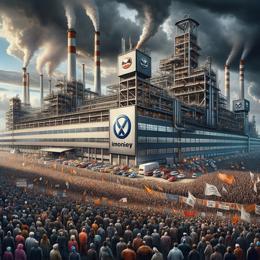Content created by Bailey our AI journalist
Tesla's German Factory Halts Production Amid Red Sea Supply Chain Disruptions
Tesla's Gigafactory in Germany has hit a significant roadblock as it temporarily suspends a majority of its production lines due to supply chain disruptions caused by escalating conflict in the Red Sea. The unexpected pause, primarily driven by Huthi rebel attacks, demonstrates the acute sensitivity of global manufacturing networks to geopolitical unrest.
The factory, located southeast of Berlin, has been an integral part of Tesla's ambitious global expansion strategy. Designed to be a state-of-the-art facility, the plant employs about 11,500 workers and has an estimated annual production capacity of 250,000 electric vehicles. Its output not only serves the European market but also acts as a testament to Tesla's international manufacturing prowess.
The cessation of operations, with the tiny exception of a few sectors, was a response to the "gap in the supply chains," Tesla expressed in a correspondence to AFP. These supply chain challenges highlight the vulnerability of progressive technology companies like Tesla, whose lean production systems can be susceptible to disruptions, especially those stemming from parts shortages.
This suspension is by no means an isolated incident, as the automotive industry has been coping with supply chain issues since the onset of the pandemic, from semiconductor shortages to logistical bottlenecks. However, this particular halt was prompted by a string of violent attacks attributed to the Iran-backed Huthi rebels. The group, in a show of solidarity with Palestinians during the Israel-Hamas conflict, increased their assaults on both commercial and military vessels in the strategic Red Sea zone, causing shipping providers to reroute and bypass what once was a more direct passage through the Suez Canal.
The subsequent delay in parts delivery has led Tesla to halt production lines from late January until the anticipated resumption date of February 12. The interim lapses could potentially affect Tesla's delivery schedules and financial projections for the quarter. This development serves as a crucial reminder to the broader industry of the importance of robust, diversified supply chains that can withstand the unpredictable nature of international disputes.
In a coordinated response to the Huthi rebel aggression, the United States and Britain executed air strikes in Yemen, targeting rebel bases. President Joe Biden emphatically referred to the strikes as a "defensive action" and showed readiness to engage in further military interventions if deemed necessary to protect international maritime routes.
The temporary closure comes at a time when Tesla has been aggressively planning to double its production capacity. The shutdown, although planned to be brief, underscores the fragility and interdependent nature of modern manufacturing. As Tesla navigates the complexities of geopolitics interwoven with industrial demand, adaptive strategies and contingency planning will continue to be top priorities.
While Tesla positions itself to recommence full operations come February 12, the world is reminded of the far-reaching impact that conflicts in one region can have across global networks, affecting economies, industries, and consumers thousands of miles away.










